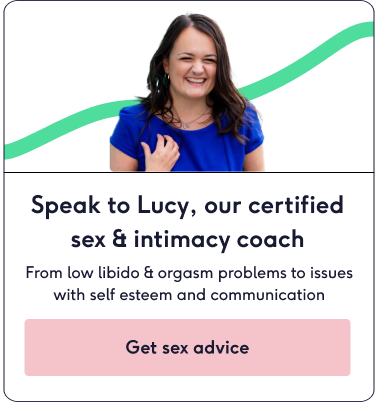
No sex drive? How to stop it ruining your relationship
In this article
What's the lowdown?
Losing your libido is very common, and it is normal for your libido to fluctuate throughout your lifetime. That said, there is a lot you can do about it so that it doesn’t negatively impact your relationship or marriage
There are many reasons why you may have lost your sex drive. Some are physical, some are medical, some are psychological, some are to do with your relationship, some with your lifestyle. It’s usually a combination of these factors
Lack of physical intimacy can take a real toll on your relationship, so it’s important to get support as soon as you can
There are many things you can do to help with your low libido, all is not lost!
Have you lost your sex drive? Maybe you’ve always had a low desire for sex, or maybe this is a recent thing, but if you’re experiencing low sex drive or even no sex drive at all, you’re probably intimately familiar with the effects it’s having or has had on your relationship.
Your sex drive is also known as your libido or your sexual desire. While losing your sex drive can feel devastating, all is not lost – there is so much you can do to revive it! Let’s explore why this can happen, what effects it can have on your relationship, and most importantly, some actions you can take to get your sex drive back.
Why do I have no sex drive?
The reasons for you having no sex drive or losing your libido are varied, here’s the lowdown on some possible causes…
- Medications have been shown to impact your libido. In my experience working with female clients, many of them have reported an abrupt change in their libido and orgasmic response when they started taking antidepressant or antipsychotic medication, even though it was needed for their mental health at the time. Culprits can include:
- SSRI antidepressants
- antispsychotics
- antihistamines
- heart medication
- some forms of hormonal contraception
- Hormonal changes: The menopause, your menstrual cycle, conditions like PCOS and PMDD, to going through gender affirming treatment including when you are taking hormone replacement therapy.
- Stress and burnout: Whether it’s your job or business, income, moving house, family, illness, bereavement where you live, or just low level, ongoing chronic stress
- Vulva or vaginal pain: Whether it’s thrush, vaginismus, vaginitis, vulvodynia, dyspareunia (painful sex), or an undiagnosed pain where doctors cannot find a cause; if penetration is hurting you, then it’s pretty inevitable that you will lose your desire for sex too
- Chronic pain or long term health conditions: Because if you are trying to navigate constant pain, fatigue, dizziness, and a myriad of other symptoms, this can really impact your libido
- Your body has changed: Maybe you’ve gained or lost a lot of weight, you’ve had surgery, an injury, given birth, or you’re going through the menopause and your body isn’t what it used to be
- Mental health and trauma: Depression, anxiety, OCD, or past trauma you haven’t fully processed yet
- Pregnancy, birth, and postpartum: From all the hormonal changes and changes to your body, to tearing during childbirth, not fully recovering afterwards, and general fatigue from taking care of an infant
- Sexual boredom and not having your needs met: If it’s been the same old thing for years, what your partner is doing just isn’t working, or not feeling turned on by what you are doing
- Communication issues and conflict with your partner: Repeated arguments, not being able to forgive a past betrayal, to just struggling to get on the same page with each other
- Lack of sexual chemistry with your partner: Maybe you are both lacking in sexual skills, or you don’t feel attracted to them anymore
- You’re on the asexuality spectrum: Sexual desire is a spectrum just as much as sexual orientation and gender identity. You may be asexual or demisexual.
As you can see from this extensive list, some causes are physiological, some are mental and emotional, some are lack of awareness, and some are caused by your relationship. Usually it’s a combination of various factors..
Your libido can be affected by so many things, especially in women or folk who are AFAB.
Think of your libido or your sex drive like the canary in the coalmine, where it’s telling you that something needs addressing in your life.
Remember that your libido is something that naturally fluctuates over the course of your life, it’s not fixed. It changes not just in your desire for sex, but often what kind of sex you desire, how it feels in your body, and what you like.
Some people also find that their contraception affects their sex drive. If you want to discuss changing your contraception and the possible side effects, you can speak to one of our women’s health GPs to discuss your options.
The effects of the lack of physical intimacy on your relationship
Lack of physical intimacy has a knock on effect on your whole relationship that is far bigger than how often you have sex.
For you, you may be feeling frustrated at yourself, embarrassed or even ashamed that there is something “wrong” with you because you can’t satisfy your partner (there isn’t, by the way). You can end up feeling like the gatekeeper of your relationship, where you are constantly refusing and pushing your partner away, and then you feel resentful, frustrated, and sad because of that. You may find yourself unconsciously trying to avoid your partner– by burying yourself in work, kids or hobbies, deliberately going to bed earlier, or just pulling away from them when they try to kiss you.
You can also lose your sexual confidence. This is what Jennie* said:
“I became a mother in November last year, and it was like my sex drive evaporated. I’ve found it so difficult, as I have previously very much embraced my sexuality, and the pleasure I derived from sex. Between postpartum hormones and the contraceptives I’m taking, I feel like I’ve been robbed of my spark. Motherhood is beautiful, and has given me a new light in my life, but I hope my sex drive returns sometime.”
For your partner they can also feel very frustrated too. They may feel like they are being constantly rejected, like there is something wrong with them for wanting to enjoy sex with you, or like they are doing something wrong. They may worry that you don’t find them attractive anymore, or if you still love them, and then feel incredibly lonely. This then can turn into feeling resentful and angry, which then spills out into the rest of your relationship like arguing more or avoiding time with each other. This is why it is so important to address the elephant in the bedroom as soon as you can.
How to stop the lack of sex drive from ruining your relationship
Remember that all couples will experience mismatched libidos during the course of their relationship or marriage at some point. There will be times where one of you has a higher libido than the other, where your preferences will change, and your body will change, this is all normal! Here are some practical tips to try:
Communicate!
It is vitally important that you communicate what is going on for you with your partner, especially on how it feels for you and how you feel about them, so they can understand and not feel alone. If this feels anxiety provoking, it may help to journal on how you feel and/or talk about it first with somebody you trust who is more neutral.
Find out what your sexual accelerators and brakes are
In the book, “Come As You Are”, by Emily Nagoski, she explains how we all have unique sexual “accelerators” – ie what makes us excited and horny, and sexual, “brakes” – ie what shuts down sexual desire. It’s also known as, “turning off the offs and turning on the ons”. (If you want to nerd out on sexual science, this comes from research at The Kinsey Institute on the Dual Control Model of Sexual Response.) Think about what you need to feel your most horny and receptive, and what gets in the way, and then you can ask for what you need more easily. You could also explore what your Erotic Blueprint is, which was a system designed by sex educator, Jaiya, whereby we all have different erotic personality types.
Tackle your stress
This could look like getting into a mindfulness practice, regular yoga, getting out in sunlight every day, or doing things to complete the stress cycle such as boxing, running, punching pillows, or singing.
Mindfulness practices are documented to be incredibly beneficial for sexual concerns, including with vulval pain, past traumatic experiences, and general sexual anxiety. Also think about what practical things you need to change in your life – such as delegating, asking for help, setting boundaries, getting support with childcare, or a career change. What you do doesn’t matter as much as making it a priority and being intentional about it.
Take sex off the menu for now
What if you could play with the idea of taking sex – i.e intercourse and penetration – completely off the menu, and instead explore all the other avenues of being intimate with each other? You could journal on it, on what you would love to explore, and talk about it with your partner.
Non-sexual touching
Explore all the non-sexual ways you can touch, like holding hands when you’re out, cuddling on the sofa, massages, foot rubs, or even kissing. You may want to explore sensate focus as an option to get back to touching each other without the expectation of it leading to intercourse.
Make intimacy a priority
Actually schedule intimacy into your calendar and make it just as much a priority as all your other appointments to remind yourself how important it is. You don’t have to schedule in sex, but you could schedule in a proper date night, time to massage each other, or exploration time. Or you could schedule in a couples’ workshop or retreat, time to read books or watch series on sexuality.
Move your body
Did you know fitness and exercise are great for your libido? You don’t need to punish yourself doing crossfit – in fact too much high intensity exercise can have the opposite effect – just find a form of joyful movement that feels good to you and helps you feel alive.
Dancing is one of the best forms of movement for libido, especially if it’s working with erotic and sensual movement. In my own client work, I use a combination of both talk-only approaches and mindful movement practices. I have found that they usually enjoy the movement practices and find them much more beneficial than just talking alone. I liken it to seeing the lights come on in their eyes again, and it’s very powerful to witness. It doesn’t matter what kind of dancing you do, whether it’s salsa or bachata, bellydance, burlesque pole fitness, or just putting on some music and dancing in the kitchen.
Self-pleasuring and masturbation
Many research studies suggest that regular masturbation actually helps increase your desire for partner sex, rather than the opposite. Think of it as feeding your own erotic fire, and tending to your own sexual needs just as much as you would your partner’s. You can also schedule this into your calendar, where you make solo sexy exploration a priority. Use all your toys or just your hands and imagination, and add in some pelvic rocking and breath.
Rekindle your creativity
In tantra, they say that your sexual energy is also your creative energy, so now is the time to get back into your passions. Whether it’s getting back into your art, dancing, writing, or anything else (you could even start writing your own erotic fiction and fantasies), let’s re-awaken your passions again.
Get help with your low libido
If you’re looking for practical support to help with your low libido, then working with a sex coach can help you. A sex coach is somebody who is specifically trained to help people with their sexual problems, to provide accurate and pleasure-focused education and then actionable tools to start doing. Sex coaches work in a holistic way, where we work with all of you and affirm your sexuality as something positive and important. We are sex-positive, empowering, and affirmative of your sexuality and sexual expression, and stand for your pleasure.
When you work with a sex coach, you get a mix of bespoke sexuality education, exercises tailored to your unique needs, and a sex-positive ally to support your sexual goals.
Sex coaches can help with issues like:
- Orgasm difficulties
- Low libido
- Body image issues
- Vulval and vaginal pain
- Sexual communication
- Exploring fantasies
You can book a one-off introductory consultation with The Lowdown’s resident sex coach (me!) to discuss your needs and concerns. During your session, I will provide an affirming and listening ear, and then offer you some simple and practical suggestions to try. You can also explore working with me for a longer period of time if this is what you need. I am totally sex-positive, LGBTQIA+ affirming, and kink-friendly too!
Our medical review process
This article has been medically reviewed for factual and up to date information by a Lowdown doctor.


